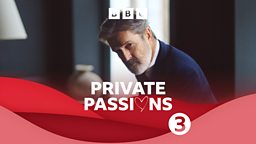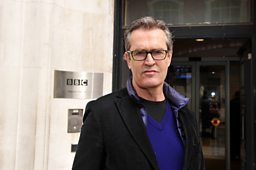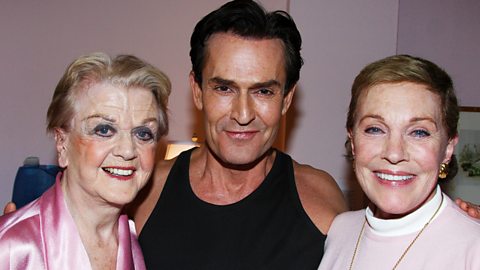10 things we learned when Rupert Everett met Michael Berkeley
Actor, writer and director Rupert Everett has enjoyed a long and fascinating career. After leaving school at 16 to attend drama school, Everett found fame in the celebrated 1984 British film Another Country. Since then, he has starred in Hollywood films, including opposite Julia Roberts in My Best Friend’s Wedding, as well as taking leading roles in the West End and on Broadway. He has also directed, written and played the lead in a passion project about Oscar Wilde’s final years, made a number of documentaries and written memoirs and a collection of short stories. In Radio 3's Private Passions, Everett reveals to Michael Berkeley some of the most intriguing stories of his rise to fame.
Private Passions with Michael Berkeley

Music was his first love
Choosing works by Handel, Purcell, Wagner and Mahler, Everett reveals to Michael Berkeley that music was particularly important in his early life before acting took over. At school, Everett sang in the choir as a treble and also played the violin in the school orchestra.
I never could go quite the whole hog in destroying myself.
Also versed in the clarinet, the piano and the organ, Everett found the music room to be “a great refuge” and a “great escape from a very hearty rugby and football obsessed establishment.”
An early example of Everett’s mischievous nature, something that he brought to some of his acting roles, came when he played Over the Rainbow on the organ during communion. “I always remember the teacher's faces looking horrified,” he said.
His father instilled a tough work ethic in him
Everett was brought up in rural Essex, attending boardings schools in Hampshire and Yorkshire (where he was taught by monks!) before going to drama school. His father had served as a major in the army and, as Michael identifies, this gave Everett a stoic outlook, he says, “in a strange way.”
Explaining that he was tough on himself, Everett said: “I think the fact that I survived the battering I gave myself really from the age of 16 to 30 ish was to do with having a kind of very serious and tough work ethic instilled into me. I never could go quite the whole hog in destroying myself.”
He decided that Julie Andrews was his mother
Evoking the exciting ambiance that cinemas still had in the 1960s (“the films seemed to come out from the screen as opposed to being projected onto it”), Everett tells Michael that watching the 1964 classic Mary Poppins was a formative experience for him. The film led Everett to imagine another life – but not just on stage.
“I decided that Julie Andrews was my mother,” he recalled, “I was her daughter and I'd just been dumped on this rather tiresome and common military family.”
Everett’s mother ended up taking him to a child psychologist but left post-haste when the psychologist started to ask her about her sex life!

His early roles were playing female characters
After his first year at Ampleforth catholic school in Yorkshire, Everett started to get into acting. His experiments dressing up as a woman as Julie Andrews’s “daughter” held him in good stead for the roles he took on. “I got to play all the girls’ parts in the plays, which I adored… I was Titania in Midsummer Night's Dream. I was Elvira in Blithe Spirit, and then my swan song was as Mary Stuart in Schiller's Mary Stuart - I think that was my greatest performance.”
I think people don't really remember what it was like when AIDS hit… you realised that everybody else was quite frightened of you, and you were obviously frightened too.
He was a leather queen
Living in London and attending drama school in the mid-Seventies, Everett, then in his late teens, discovered the gay scene. It was quite by chance: he was out walking his landlord’s dogs, Samson and Biscuit, when he observed an “apparition” coming towards him, describing “this big, tall man in black leather with a black leather hat.” Following him to The Coleherne Arms on the Old Brompton Road, Everett and co peered through the window to see “these cowboys and leather queens and fairies and skinheads.”
“We couldn't believe it,” says Everett, “so I rushed Samson and Biscuit back home and then I came back and started a new kind of chapter in my life – the chapter as a leather queen – which I thoroughly enjoyed.”
He was fired from the RSC
Everett was a dresser at drama school and one of his jobs was working for RSC actor Alan Howard during a production of Coriolanus. “He had these amazing leather costumes and of course being a young leather queen, I was eyeing these costumes very greedily,” explains Everett. Rupert wore the costume to a club called Bang but then left it at home. “In those days to think of a decent excuse, so I told them I took it to this leather club, and then I got fired from the RSC.”
He experienced the highs and the lows of the gay scene
Everett describes the gay scene in 1970s London as “classless, ageless and raceless” and “an amazing melting pot” where a Duke and a plumber would find common ground. “It was a wonderful Midsummer Night's Dream world.”
By the early 1980s, however, the global AIDS pandemic had started and was to claim the lives of thousands of homosexual men. The fear of the disease was palpable and, as Everett explains, would be ever-present in every situation.
“I think people don't really remember what it was like when AIDS hit. You'd go to Sunday lunch with a family and you'd see your plates being taken gingerly away to wash up separately from the others… you realised that everybody else was quite frightened of you, and you were obviously frightened too, because a lot of people you knew were already suffering with it. It was a very difficult and scary time.”

"I had to pinch myself, I was so excited..."
Rupert on the "perfect end to my childhood fantasy of being Julie Andrews's daughter".
He got to circle back to Julie Andrews
Everett’s role in Duet for One, partly based on the life of cellist Jacqueline du Pré, allowed him to fulfil his dream of being in Julie Andrews’s charge. In this case, Andrews played mentor to his protégé. The role involved them both learning the violin. “I was to show up at the Dorchester Hotel for a month of violin classes with Julie Andrews. I had to pinch myself. I was so excited,” Everett says. He told Andrews about his childhood dream and, though shocked at first, she got to the point where she would sign cards to him as “Mummy”.
Julie Andrews is a goddess in my mind. When Julie Andrews goes, I'm going.
“The last time I saw her I was in Blithe Spirit on Broadway with Angela Lansbury,” says Rupert. “I was on stage one afternoon and Angela Lansbury whispered to me during the show, ‘Mommy's in the audience.’” Andrews joined Lansbury in her dressing room after the show. “I've got the greatest picture of me and Angela and Julie together, says Everett, adding: “Julie Andrews is a goddess in my mind. When Julie Andrews goes, I'm going.”
Oscar Wilde is an icon to him
Everett wrote, directed and starred in The Happy Prince, a biopic of Oscar Wilde’s life focusing on his final years in Paris. He explains why this period is so crucial: “Oscar in Paris is a very important person if you're gay, because I think there is where the road to gay liberation started – finally there was a face to homosexuality. There hadn't been one before because it was all undercover. But once you saw Oscar waddling down the boulevard and he was famous, you could say ‘there's a homosexual.’”
He wants to play older than he is
Acting gets harder as a profession, Everett believes, especially as you get older. “There's thousands of us OAPs scrabbling, elbowing each other out of the way for the two or three decent roles for an octogenarian. But I'm now taking a leaf out of the Shirley MacLaine playbook: at the age of 50, she decided to play older. That's what I want to do, too, because I want to play 90 and at least I can remember the lines.”
-
![]()
Private Passions: Rupert Everett's music choices
George Frideric Handel: I know that my Redeemer liveth (Messiah) • Maurice Ravel: Piano Concerto in G major (2nd mvt) • Richard Wagner: Parsifal: Act I. Prelude • Vangelis: Love Theme (Blade Runner) • Johann Sebastian Bach: Concerto in D minor for two violins, BWV 1043 (1st mvt) • Ludwig van Beethoven: Symphony No 9 in D minor, Op 125, 'Choral' (3rd mvt) • Gustav Mahler: Das Lied von der Erde – Von der Schönheit • Henry Purcell: When I am laid in earth (from Dido and Aeneas).

More Private Passions...
-
![]()
Lola Young, Baroness Young of Hornsey
Michael Berkeley's guest is Lola Young, Baroness Young of Hornsey, who grew up in care, and studied for a degree in her 30s, which led to a PhD, and eventually a professorship.
-
![]()
Dame Maggie Aderin-Pocock
Michael Berkeley's guest is the space scientist Dame Maggie Aderin-Pocock, the co-presenter of The Sky at Night on Βι¶ΉΤΌΕΔ TV, and a passionate science communicator.
-
![]()
Bryan Ferry
Michael Berkeley's guest is the singer and songwriter Bryan Ferry, co-founder of the band Roxy Music.
-
![]()
Lucian Msamati
Michael Berkeley's guest is the actor Lucian Msamati, whose acclaimed performances include Salieri in Amadeus at the National Theatre and Iago in Othello for the RSC.





